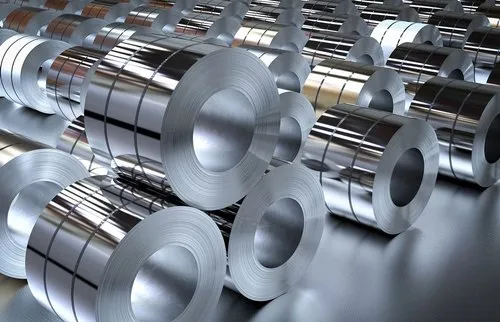Silicon steel, also known as electrical steel, is a specialized material used extensively in the manufacturing of electrical motors and transformers. Its unique magnetic properties make it an essential component in the production of electrical equipment that requires efficient energy conversion and minimal energy loss. Silicon steel coils are critical to optimizing the performance of electric motors and transformers, which are foundational to industries ranging from power generation to transportation.
In this article, we will explore the properties, manufacturing process, and key applications of silicon steel coils in electrical motor and transformer manufacturing, highlighting their significance in achieving high efficiency and performance.
What is Silicon Steel Coil?
Silicon steel is an alloy of iron that contains silicon, which enhances its electrical properties. The silicon content typically ranges from 1.5% to 6.5%, and its primary role is to increase the material’s magnetic permeability while reducing energy losses during operation. Silicon steel is manufactured in the form of coils, sheets, or strips, which are then used in the construction of electrical equipment that requires high magnetic efficiency, such as transformers and electric motors.
The main characteristic of silicon steel coils is their ability to conduct magnetic flux efficiently with minimal resistance, making them indispensable for high-efficiency electrical applications. This material is primarily used in the core components of electrical motors and transformers where magnetic fields play a crucial role in the operation.
Key Properties of Silicon Steel Coils
The unique magnetic properties of silicon steel make it highly suited for electrical motor and transformer manufacturing. Some of the key properties include:
- High Magnetic Permeability: Silicon steel coils have a high magnetic permeability, meaning they can efficiently conduct magnetic fields, which is critical in the functioning of electric motors and transformers.
- Low Core Loss: One of the main advantages of silicon steel is its ability to minimize core losses, which occur when magnetic flux induces heat in the material. This feature ensures that transformers and electric motors operate with maximum efficiency.
- Low Eddy Current Loss: Silicon steel’s electrical resistivity reduces eddy current losses, which are unwanted currents that occur in conductive materials when exposed to alternating magnetic fields. This further enhances energy efficiency in electrical devices.
- Improved Durability: Silicon steel coils are known for their strength and durability, making them suitable for continuous use in high-performance applications such as motors and transformers.
- Grain-Oriented Structure: In many silicon steel coils, the grain structure is oriented in a specific direction, enhancing the material’s magnetic properties and making it ideal for high-efficiency electrical applications. This orientation helps in reducing losses and improving the overall performance of the device.
Manufacturing Process of Silicon Steel Coils
The production of silicon steel coils involves several steps to ensure that the material possesses the necessary magnetic properties and strength for electrical applications. These steps include:
- Steel Production: The process begins with producing base steel, primarily iron, which is alloyed with a specific percentage of silicon. The silicon content is carefully controlled to achieve the desired magnetic properties.
- Hot Rolling: After the alloy is created, the steel is hot-rolled into thin sheets or strips. This process reduces the thickness of the steel and creates a smooth surface for further treatment.
- Annealing: To enhance the magnetic properties of the steel, it undergoes an annealing process. During annealing, the steel is heated to a high temperature in a controlled atmosphere, allowing the grains in the steel to align and optimize its magnetic characteristics. Grain-oriented silicon steel is specifically treated to orient the grains in the direction of rolling, improving its efficiency in electrical applications.
- Cold Rolling: After annealing, the steel is cold-rolled to achieve the desired thickness and surface finish. Cold rolling further refines the material and ensures it meets the precise specifications required for electrical applications.
- Surface Treatment: The final step in the manufacturing process involves applying a thin coating to the steel to prevent oxidation and improve insulation properties. This coating can also help reduce eddy current losses and protect the material during operation.
Applications of Silicon Steel Coils in Electrical Motors and Transformers
Silicon steel coils are integral to the manufacturing of electrical motors and transformers, where they are used in the core material to optimize efficiency. Let’s look at how silicon steel coils are utilized in these critical electrical devices:
1. Transformers
Transformers are key components in power transmission and distribution systems. They work by converting electrical energy from one voltage level to another. Silicon steel coils are used in the core of transformers to enhance their magnetic properties, allowing for efficient energy conversion with minimal energy loss. The high magnetic permeability of silicon steel ensures that transformers operate with low core losses, making them energy-efficient and reducing the need for excessive heat dissipation.
The grain-oriented silicon steel used in transformer cores is particularly effective in minimizing core losses, which is vital for maintaining transformer efficiency over long periods.
2. Electric Motors
Electric motors, from small household appliances to large industrial machines, rely on the efficient operation of their magnetic cores. Silicon steel coils are used in the stator and rotor cores of motors, where they help to generate strong magnetic fields that drive the motor’s movement. The high electrical resistivity and low core loss of silicon steel allow electric motors to operate with higher efficiency and reduced energy consumption.
In applications such as electric vehicles, high-efficiency motors are essential, and silicon steel coils play a critical role in improving performance while reducing operational costs. Whether in HVAC systems, robotics, or consumer electronics, silicon steel is fundamental to ensuring that motors run smoothly and efficiently.
3. Inductors and Reactors
Inductors, used in power supply circuits, and reactors, used in electrical power systems, also rely on silicon steel coils. These devices require the efficient conduction of magnetic fields to regulate electrical currents and maintain stability in power systems. Silicon steel’s low core loss and high magnetic permeability make it an ideal choice for these applications.
4. Electric Generators
In electric generators, silicon steel coils help convert mechanical energy into electrical energy. By enhancing the magnetic properties of the generator’s core, silicon steel allows for more efficient electricity generation with minimal energy loss.
Benefits of Silicon Steel Coils in Electrical Applications
The use of silicon steel coils in electrical motor and transformer manufacturing offers numerous benefits:
- Energy Efficiency: The high magnetic permeability and low core losses of silicon steel coils ensure that electrical devices like motors and transformers operate at high efficiency, reducing energy consumption and operational costs.
- Reduced Heat Generation: By minimizing energy losses, silicon steel coils help reduce heat generation, which can prolong the lifespan of electrical equipment and prevent overheating.
- Improved Performance: Silicon steel’s tailored magnetic properties optimize the performance of motors and transformers, ensuring smooth operation with minimal disruptions.
- Cost-Effective: Although silicon steel may be more expensive than conventional materials, its efficiency gains in electrical devices often lead to long-term savings in energy costs and reduced maintenance requirements.
- Long-Term Durability: The durability of silicon steel coils ensures that electrical motors and transformers continue to function effectively over extended periods, contributing to the overall reliability of power systems.
Conclusion
Silicon steel coils are an indispensable material in the manufacturing of electrical motors and transformers. With their excellent magnetic properties, low core losses, and high energy efficiency, they play a critical role in optimizing the performance of electrical systems used in power transmission, generation, and industrial machinery. The continued advancement in silicon steel manufacturing ensures that these components remain at the forefront of electrical engineering, providing solutions that enhance energy efficiency and drive technological progress in electrical applications.







